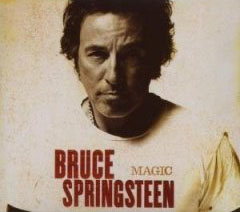![]()
| Bruce Almighty |
|
![]()
Springsteen has us believing in his 'Magic' with a thrilling return to vintage E Street.
by Chris Willman in Entertainment Weekly
Bruce Springsteen
Magic
(Columbia)
Rock
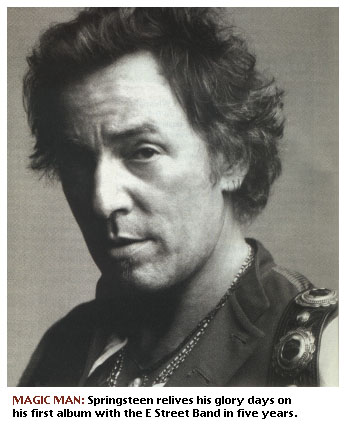
![]() ave a little faith/There's magic in the night," Bruce Springsteen sang on 1975's "Thunder Road." And for keeping the faith along the decades of back roads and stylistic detours, fans get their beautiful reward with Magic, his best record since The River in 1980. If such devotees assumed that the new album's title was a not to rekindling the tattered romanticism of his salad days, they wouldn't be wrong. Magic marks only the second instance in more than two decades that Springsteen has made a studio CD with the E Street Band -- and unlike the last reunion, he's not resisting their signature sound. Synths get a breather so Roy Bittan can return to those classic piano arpeggios; stirring key changes are again signaled by Clarence Clemons' sax solos; arena-friendly sing-alongs arrive in quick succession. If you were raised on this stuff, you may experience the giddy sensation that the world has been set aright again.
ave a little faith/There's magic in the night," Bruce Springsteen sang on 1975's "Thunder Road." And for keeping the faith along the decades of back roads and stylistic detours, fans get their beautiful reward with Magic, his best record since The River in 1980. If such devotees assumed that the new album's title was a not to rekindling the tattered romanticism of his salad days, they wouldn't be wrong. Magic marks only the second instance in more than two decades that Springsteen has made a studio CD with the E Street Band -- and unlike the last reunion, he's not resisting their signature sound. Synths get a breather so Roy Bittan can return to those classic piano arpeggios; stirring key changes are again signaled by Clarence Clemons' sax solos; arena-friendly sing-alongs arrive in quick succession. If you were raised on this stuff, you may experience the giddy sensation that the world has been set aright again.
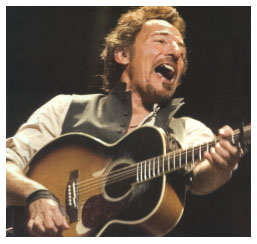 There is no trickery, however, to the naturalness of the band vibe here. On 2002's emotional but musically uneven The Rising, you could sense everyone straining with producer Brendan O'Brien to figure out how to bring the E Street Band into the 21st century -- then finally arriving at what felt like a Springsteen "solo" album that happened to graft in the old gang. But Magic, also produced by O'Brien, gets it right from the start by mostly ditching recent rootsy flavorings for a compressed wall of sound. Sometimes that wall is gorgeously Spectorian, as with the glockenspiel-and-timpani-adorned pop stunners "Girls in Their Summer Clothes" and "Your Own Worst Enemy," which Springsteen delivers in a tender, rasp-free register barely heard since "Born to Run." Sometimes it's a garage wall, as on "Radio Nowhere," which gives axman (and ex-Sopranos hitman) Little Steven a cranky guitar blowout to play, unapologetically, on his garage-rock radio show.
There is no trickery, however, to the naturalness of the band vibe here. On 2002's emotional but musically uneven The Rising, you could sense everyone straining with producer Brendan O'Brien to figure out how to bring the E Street Band into the 21st century -- then finally arriving at what felt like a Springsteen "solo" album that happened to graft in the old gang. But Magic, also produced by O'Brien, gets it right from the start by mostly ditching recent rootsy flavorings for a compressed wall of sound. Sometimes that wall is gorgeously Spectorian, as with the glockenspiel-and-timpani-adorned pop stunners "Girls in Their Summer Clothes" and "Your Own Worst Enemy," which Springsteen delivers in a tender, rasp-free register barely heard since "Born to Run." Sometimes it's a garage wall, as on "Radio Nowhere," which gives axman (and ex-Sopranos hitman) Little Steven a cranky guitar blowout to play, unapologetically, on his garage-rock radio show.
If there's another "Glory Days" here -- an inevitable concert standby than Bon Jovi will spend the next decade trying to rip off -- it's "Livin' in the Future," an insanely jubilant celebration of denial as a coping mechanism. "None of this has happened yet," the gleeful choruses insist as Clemons wails on his horn and everyone joins in a "na-na-na-na-na" cheer. This, despite almost apocalyptic verses about how the singer's "faith's been torn asunder" by both his girl and his country. That's one of many Magic passages where it's intriguingly, purposely unclear whether Springsteen is describing wartime malaise and social dystopia or simply a bust-up between lovers.
No album could say more about the uncertain national mood of 2007, though that's only part of the set design. Springsteen's topical allusions are unspecific enough that Magic will remain enchanting after we get these American messes straightened out, in 5, 10, 50 years. Still, he does finally bring the war to the fore in the climactic "Devil's Arcade," and an album that began with Bruce yelling "Is there anybody alive out there?" ends on real matters of life and death. This big, slow-building ballad finds a young woman visiting her beloved in a military hospital, whispering promises of an idyllic suburban future and finally repeating the line "the beat of your heart" over and over, as if that very incantation could keep him tethered to the corporeal world. It's a moment that will break even a hardened rock fan's heart. But by then your resolve might already be melting from the realization that, three and a half decades into his career, Bruce Springsteen is back in the masterpiece business. A ![]()

| Troubled Waters |
|
![]()
Memorable performances keep 'Deliverance' afloat some
three decades after its first trip down the river wild.
Deliverance
Deluxe Edition
Burt Reynolds,
Jon Voight
R, 109 mins., 1972
(Warner Home Video)
by Chris Nashawaty in Entertainment Weekly
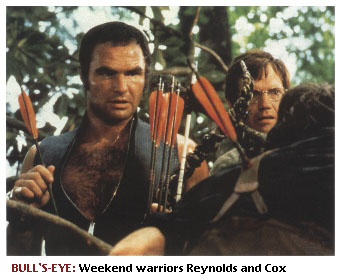
![]() efore heading down the Cahulawassee River, Burt Reynolds was probably best known as the half-Indian Quint Asper from an early-'60s stint on Gunsmoke. There had been a few failed TV shows after that, and a handful of films with such memorably unmemorable titles as Shark, Fuzz, and Navajo Joe, but essentially Reynolds' career was drowning fast. That is, until the Cahulawassee came calling.
efore heading down the Cahulawassee River, Burt Reynolds was probably best known as the half-Indian Quint Asper from an early-'60s stint on Gunsmoke. There had been a few failed TV shows after that, and a handful of films with such memorably unmemorable titles as Shark, Fuzz, and Navajo Joe, but essentially Reynolds' career was drowning fast. That is, until the Cahulawassee came calling.
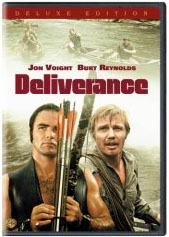 Cocky, macho, and handsome as hell, Reynolds gives an electric performance as the alpha-male weekend warrior Lewis Medlock -- one of the many reasons why Deliverance holds up 35 years later. There's also Vilmos Zsigmond's cinematography, a pair of dueling banjos, and the note-perfect casting of Jon Voight, Ronny Cox, and Ned Beatty -- poor Ned Beatty -- who's had to endure "squeal like a pig" heckling ever since the film's notorious hillbilly rape scene.
Cocky, macho, and handsome as hell, Reynolds gives an electric performance as the alpha-male weekend warrior Lewis Medlock -- one of the many reasons why Deliverance holds up 35 years later. There's also Vilmos Zsigmond's cinematography, a pair of dueling banjos, and the note-perfect casting of Jon Voight, Ronny Cox, and Ned Beatty -- poor Ned Beatty -- who's had to endure "squeal like a pig" heckling ever since the film's notorious hillbilly rape scene.
Nominated for three Oscars including Best Picture, John Boorman's adaptation of James Dickey's bestselling wilderness nightmare follows four pals who try to tame Mother Nature, only to wind up on the business end of her wrath. They're city men made soft by wealth and progress, trying to recapture something in themselves that they've lost. Unfortunately, the new deluxe edition's extras don't add much to the film's impact: There's a vintage making-of featurette, which has appeared on previous DVD incarnations; a four-part retrospective that includes recent interviews with the film's principals but lacks the insight one would hope for (Beatty, perhaps understandably, has precious little to say about his infamous scene); and Boorman's slightly stuffy commentary track, which feels padded with anecdotes he's told a million times before.
Fortunately, the film still speaks eloquently enough for itself. And, of course, there's Reynolds' mesmerizing performance. With his Mephistophelean swagger and chewy, good ol' boy drawl, Reynolds is a chest-beating revelation. If you squint hard enough, you can still see a struggling small-screen actor on the verge of becoming the biggest star of the '70s. B+ ![]()
![]() Reader's Comments
Reader's Comments
No comments so far, be the first to comment.

